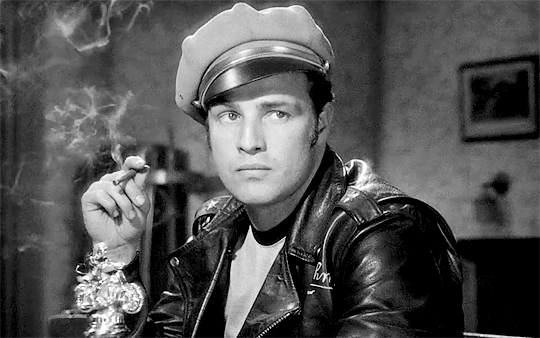
“Whaddya got?"
The Wild One
Blog Post — June 2018
Marlon Brando did for screen acting what Joyce did for the novel, what Dylan did for songwriting. To comprehend Brando’s significance as an actor, conceive of a world w/o DeNiro, Pacino, Streep, Nicholson, Hoffman, Penn, Depp, DDL, and certainly James Dean, who along w/ Elvis, shamelessly stole their side-burn framed scowl from The Wild One. Brando’s successors are countless, and so were his antecedents: Chaplin, Gable, Stewart, Bogart, Peck, Welles. However, Stanislavski's method style of acting was still foreign to those guys, who grew up on the stage, where projection and overacting were pro forma. Brando was the first American to go method. Those guys acted their parts, Brando inhabited his.
Take Bogart, a sophisticated, urban westerner who, classically, knew both sides of the law and was tough enough to go his own way and yet, romantically, still do right. It's gorgeous but it doesn't feel human. Brando, on the other hand, sought to look like soot; he represented a reaction against the post-war mania for security. The Brando of the early fifties was antisocial because he knew society was crap; he was a hero to youth because he was strong enough not to take the crap. It was Brando who redefined "cool" as leather jackets, sunglasses, motorcycles, promiscuity, nonchalance, and recklessness. Look it up.
DFW actually wrote an entire passage about Brando in Infinite Jest:
Brando the new archetypal tough-guy rebel and slob type, leaning back on his chair’s rear legs, coming crooked through doorways, slouching against everything in sight, trying to dominate objects, showing no artful respect or care, yanking things toward him like a moody child and using them up and tossing them crudely aside so they miss the wastebasket and just lie there, ill-used. With the over-clumsy impetuous movements and postures of a moody infant… [There was] gentle and cunning economy behind this man’s quote harsh sloppy unstudied approach to objects. The way he’d oh so clearly practiced a chair’s back-leg tilt over and over. The way he studied objects with a welder’s eye for those strongest centered seams which when pressured by the swinishest slouch still support… The world he only seemed to manhandle was for him sentient, feeling… he moved like a careless fingerling, one big muscle, muscularly naïve, but always, notice, a fingerling at the center of a clear current. That kind of animal grace. The bastard wasted no motion, is what made it art, this brutish no-care. His was a tennis player’s dictum: touch things with consideration and they will be yours; you will own them; they will move or stay still or move for you; they will lie back and part their legs and yield up their innermost seams to you. Teach you all their tricks. He knew what the Beats know and what the great tennis player knows, son: learn to do nothing, with your whole head and body, and everything will be done by what’s around you.
Brando’s fondlings were also a means of rendering communion with the universe, his playful Epicureanism often delivering a small shiver of mortality. The puppies in Zapata are the last thing he touches before he is mowed down by federal agents. Don Corleone’s last act before the attempt on his life is to buy fruit from a vendor’s stall. (He points so as not to disturb the vendor’s display with pleasing delicacy.) Brando stopped movement from the popcorn to the mouth. He got people to stop chewing. “This foul deed should smell above the earth,” he says as Marc Antony. Damn. Damn. Damn; when it’s right it’s right. You can feel it in your bones. And when the camera is close on him, his face becomes the stage; his face is the proscenium arch of the theatre, thirty feet high, and it sees all the little movements of the face and the eye and the mouth. It’s telling that during the 2008 presidential campaign, John McCain named Zapata as his preferred Brando performance while Obama listed The Godfather among his favorite movies. The rebel and the patriarch: the picks signaled the extent to which that contest was fought out between conflicting notions of paternal authority — McCain’s maverick instincts honed in the shadow of his father, Obama’s more patient paternalism a simulacra constructed in the absence of his.
Brando performed his roles the way most of us wish to perform our lives: perfectly. Though Brando was only perfect for the moments he was on screen. Between the high points Brando fell into an abyss of self-loathing, a figure of Wellesian tragicomedy fattened on burgers and fucking and unending disenchantment with the “lies” of the movie business. And he never saw himself as perfect. Terry Malloy’s speech in On the Waterfront — "I coulda had class, I coulda been a contender, I coulda been somebody, instead of a bum, which is what I am, let’s face it" — was, arguably, what clinched Brando’s first Oscar. But unlike the second win, for The Godfather, which Brando famously rejected in boycott of the occupation of Wounded Knee, the actor felt that this first one wasn’t merited. In a journal, Brando wrote: "It wasn’t me acting. It’s the audience. Everybody feels they’ve failed. Everybody feels they could have been a contender."
It's not a happy conclusion but the comisery is comforting; everyone tries to be perfect and everyone gets licked.